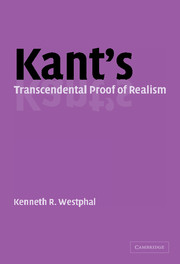Book contents
- Frontmatter
- Contents
- Acknowledgments
- List of abbreviations
- Introduction
- 1 Kant's methods: transcendental and epistemic reflection
- 2 The metaphysics of Kant's transcendental idealism
- 3 Transcendental affinity
- 4 The gap in Kant's Critique of Pure Reason
- 5 Kant's dynamic misconstructions
- 6 Kant's metaphysical proof of the Law of Inertia
- 7 Three Kantian insights
- Appendix
- Bibliography
- Index of names
- Index of subjects
4 - The gap in Kant's Critique of Pure Reason
Published online by Cambridge University Press: 06 November 2009
- Frontmatter
- Contents
- Acknowledgments
- List of abbreviations
- Introduction
- 1 Kant's methods: transcendental and epistemic reflection
- 2 The metaphysics of Kant's transcendental idealism
- 3 Transcendental affinity
- 4 The gap in Kant's Critique of Pure Reason
- 5 Kant's dynamic misconstructions
- 6 Kant's metaphysical proof of the Law of Inertia
- 7 Three Kantian insights
- Appendix
- Bibliography
- Index of names
- Index of subjects
Summary
INTRODUCTION
This chapter begins a second, independent line of internal criticism of Kant's transcendental idealism: one primary aim of Kant's Critical philosophy, to analyze and justify causal judgments, fails on its own terms. Kant claims that only transcendental idealism can justify empirical realism (A369–70). I argue to the contrary, that Kant's transcendental idealism cannot justify empirical realism because it cannot justify realism about ordinary causal judgments. Kant's answer to Hume's causal skepticism is insufficient. I stress “insufficient,” for Kant's analysis of the conditions under which alone we can make legitimate causal judgments contains a wealth of philosophical insights, unjustly neglected by scholars and philosophers alike. The inadequacies of Kant's account of causal judgments thus points the way towards a successful transcendental proof of realism, including realism about ordinary causal judgments.
This second line of criticism proceeds in three main steps. The first is to show that Kant's analysis and defense of causal judgments in the first Critique fails because the principle Kant expressly defends is that every event has a cause, although the principle he needs to defend is that every physical event has an external cause. Two further steps show that Kant's attempt to fill this lacuna in the Metaphysical Foundations of Natural Science fails. The second step is to show that Kant's argument for ascribing dynamic forces to matter fails. The third step is to show that Kant's proof of the law of inertia fails.
- Type
- Chapter
- Information
- Kant's Transcendental Proof of Realism , pp. 127 - 172Publisher: Cambridge University PressPrint publication year: 2004



